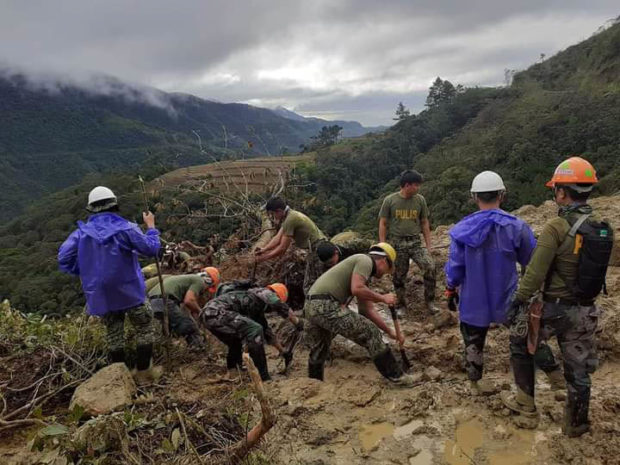
RACE AGAINST TIME Rescue workers dig up muddy ground for survivors of Thursday’s landslide that buried a
two-story house in Viewpoint village in Banawe town, Ifugao province, and swept it to a deep ravine, leaving at
least six dead. —PHOTO COURTESY OF IFUGAO POLICE MOBILE FORCE COMPANY
MANILA, Philippines — After nearly back-to-back storms pummeled provinces across Luzon in the past few weeks, environmental groups are appealing to the government to stop glorifying the narrative of Filipino resilience and instead work on genuine climate action.
Demands for better environmental protection echoed across social media platforms over the weekend, alongside calls for rescue and donations for communities that were submerged in chest-deep floods left by Typhoon Ulysses (international name: Vamco) last week.
“This is an unfortunate reality that the Philippines, one of the countries at highest risk to the climate crisis, can expect moving forward in the absence of transformative actions,” said Aksyon Klima in a statement on Saturday.
“It is yet another in a growing list of reminders that the loss and damage inflicted on vulnerable countries by the manifestations of the climate crisis are disproportionately experienced by marginalized sectors and poor communities,” the group added.
Fossil fuels
The Global Climate Risk Index places the Philippines as the second country most affected by climate change globally, as it faces a myriad of climate impacts, such as stronger typhoons and longer droughts.
Greenpeace Philippines said President Rodrigo Duterte should not just hold industrialized nations to account for the climate crisis, but also fossil fuel corporations that are largely responsible for the carbon emissions that contribute to the rapidly warming planet.
“The fossil fuel industry is composed of the world’s largest and richest companies that rake in profits by the trillions of dollars,” Lea Guerrero, the group’s country director, said, adding that “the poorest and most vulnerable communities reel from calamities caused by increasingly stronger typhoons.”
Embarking on genuine climate action, the groups said, includes shifting the country away from the use of fossil fuels, such as coal, and transitioning instead to renewable energy, such as solar and wind.
While the moratorium issued by the Department of Energy (DOE) on new coal-fired power plants is a first step, it should be followed through by further actions that would halt the use of coal in the country’s power generation, said the Center for Energy, Ecology and Development.
“We remind the DOE … not to walk when we can only afford to run in the climate race, and make sure that the moratorium would result in the nonissuance of any new certificate of endorsement, eventual revocation of existing ones and decommissioning of operating coal-fired power plants—many of which are already at the end of their life span,” the group said.
As storm-weary communities get back on their feet, government officials should still be held accountable for their inaction on the climate crisis and in disaster risk reduction and management, the center said.
“The Filipino people are indeed resilient, yet the narrative of resilience seems to have become a convenient excuse for our leaders to be negligent,” it said.
‘Inaction’
The National Union of Students of the Philippines (NUSP) called on the government to implement a school break after its “inaction” on the series of typhoons that have devastated the country.
In a statement on Saturday, the NUSP said the Duterte administration was consistent in “being heedless of the impacts of these catastrophes” while ordinary citizens remained disadvantaged.
It also urged the Department of Education and the Commission on Higher Education to implement academic breaks, extend deadlines of assignments until the end of the semester, relax requirements and uphold a “No Fail Policy” to allow the education sector to adjust to the demands of distance learning, especially after Typhoons “Rolly” (international name: Goni) and Ulysses hit the country on the heels of two relatively milder storms.
The group also slammed presidential spokesperson Harry Roque, who sought to put an end to the social media hashtag #NasaanAngPangulo (Where is the President?) that trended on social media.
“Roque has no right to shush those who ask [about] Duterte’s plans and whereabouts when the Filipino people have been grasping at … straws typhoon after typhoon, crisis after crisis,” said Jandeil Roperos, NUSP president.
—With a report from Meg Adonis